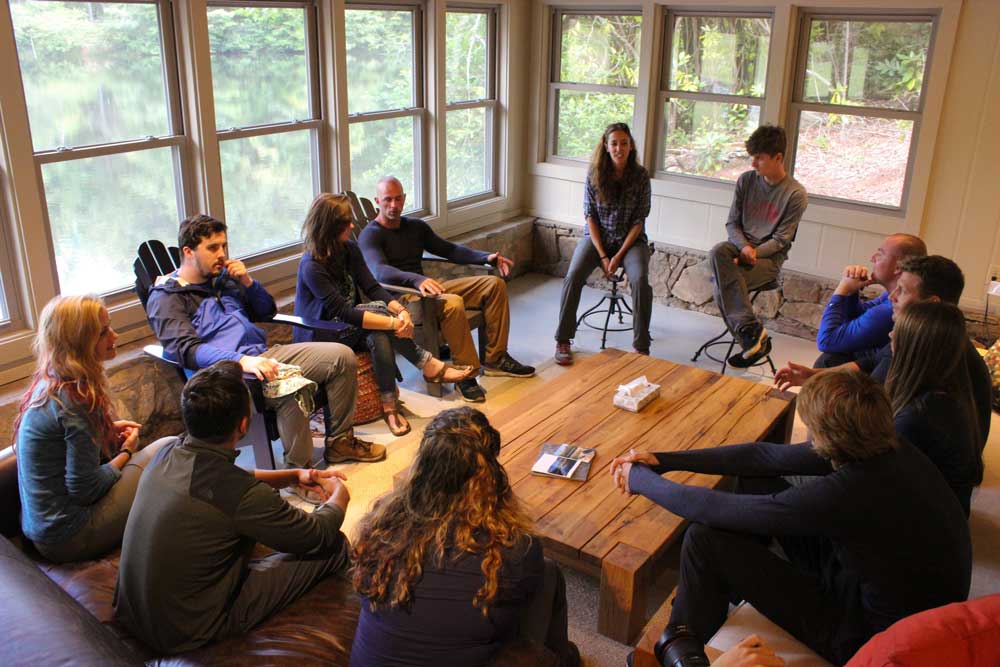Our Individualized Therapeutic Approach
Our relational-based model is founded on attachment theory, incorporates a strengths-based perspective, emphasizes trauma-informed care, focuses on developing resilience, and supports community development and engagement.
At Momentum, the focus is on understanding you, your personal strengths, and your unique needs as an emerging adult.
Our therapeutic approach centers on building healthy relationships with yourself, others, and technology. You’ll develop new relational and coping skills and work towards your individual goals.
As we work to support you on a journey of growth and healing, Momentum can be a transformative experience full of positive outcomes, offering adventure, friendships, skill building, planning, self-advocacy, and family reconnection.

Therapeutic Modalities at Momentum
Our Team of therapists, social workers, and clinicians brings a diverse array of practices from various backgrounds, skills, and specialties. We employ a strengths-based, trauma-informed, and developmental perspective across all aspects of our program, utilizing an enriching variety of evidence-based therapeutic modalities.
In order to foster well-being holistically, phase work often implements elements of:
- Cognitive Behavioral Therapy (CBT)
- Dialectical Behavior Therapy (DBT)
- Narrative Therapy
- Emotion Focused Therapy
- Experiential Therapy
- Mindfulness-Based Therapy
- Exposure Therapy
- Somatic Experiencing
- Solution Focused Therapy
- Positive Psychology
- Expressive Arts Therapy
How are individualized treatment plans developed?
Treatment plans are a collaborative, client-driven effort. Each young adult develops an individualized treatment plan in collaboration with family input and therapist guidance.
Rather than just the therapist assessing client strengths, the young adult is invited to take an active role in identifying their own strengths, concerns, and goals.
How therapy is different at Momentum:
Therapy at Momentum looks different from outpatient therapy in a couple of ways.
Individual Therapy

Each student meets with their primary therapist twice per week.
These meetings may include individual therapy sessions or a combination of individual and family therapy sessions.
Group Therapy

Therapist-facilitated groups are scheduled twice per week. In addition to these biweekly therapist-led group sessions, there is a nightly group session led by students and instructors around the fire.
Students are encouraged to attend all group therapy sessions.
Family Therapy

Family therapy sessions often start after 4-6 weeks, once the young adult and parents have identified areas for growth in their relationship together.
Family therapy sessions are scheduled on an as-needed basis and the frequency of family therapy sessions varies.
Taking a Strengths-Based Approach
Focusing on Strengths
We take a strengths perspective when it comes to mental health recovery. Our therapists work with students to identify strengths and help them apply them to cope with challenges and achieve goals.
Strengths-based therapy is particularly beneficial when clients are dealing with low self-worth or feeling disempowered.
This strategy fosters self-awareness and growth and encourages the development of new relational and coping skills. Through strengths-based practice, we cultivate an empowering environment that boosts self-esteem, enhances problem-solving abilities, and equips students to build confidence and overcome challenges.
Providing Trauma-Informed Care
Cultivating Trust & Understanding
Our team is well-equipped to identify trauma-related symptoms, recognize the widespread impact it can have, and integrate this knowledge into all facets of treatment. This trauma-informed approach complements our strengths-based approach by acknowledging the impact of trauma on an individual’s life and shaping our therapeutic practices around this understanding.
Prioritizing emotional safety, trustworthiness, and transparency to create a stable therapeutic relationship and foster a trauma-informed environment, we make sure that if and when triggers do arise, the student feels supported and heard.
By incorporating trauma-informed practices, we help individuals develop resilience and provide them with the tools necessary to manage their responses to traumatic stressors effectively.
Family Support Services
Empowering The Whole Family
As a parent of a young adult at Momentum, you have the opportunity to engage on a parallel track through our family support programs. You will learn skills that mirror the skills your young adult is learning. The focus during your work is identifying areas of growth, strength, and opportunity as a parent.
You will engage in a weekly therapeutic coaching session and then have the option to attend a weekly parent support group via Zoom. In addition, you will participate in one parent workshop session to practice and apply skills alongside other parents of young adults.
Family therapy will begin when the family therapeutic coaching and the young adult’s therapeutic parallel paths combine. These sessions will be held over Zoom and facilitated by your young adult’s therapist.
Momentum works with you and your family to develop skills of transparent communication, relational safety, mutual trust, and shared goals.
Our team supports you and your family to better understand each other, resolve and learn skills to effectively navigate conflict, and develop skills to support your increasing independence!
Some elements of our family support services include:
Challenge by Choice Philosophy
Growth often starts outside of our comfort zone. At Momentum, your therapist and mentors will work to establish a safe relational basis of trust and look to progressively challenge you with specific, measurable, attainable, and realistic goals.
Diversity, Inclusivity, and Individual Identity
Fostering a Community of Care
Momentum is committed to creating and maintaining a culture of openness, trust, transparency, and safety for individuals centered around dignity and self-worth while providing quality care.
In this effort to improve community health, we are constantly learning from the young adults at Momentum and each other, intentionally embodying respect, support, and authenticity every step of the way.
Through this commitment to community development, Momentum supports and affirms all individuals, promoting a culture of respect and understanding for race, color, ethnicity, religion, sex, national origin, age, ancestry, physical/mental ability, status as a veteran, sexual orientation, marital status, parental status, gender identity, gender expression, genetic information, and socioeconomic status of all persons.
